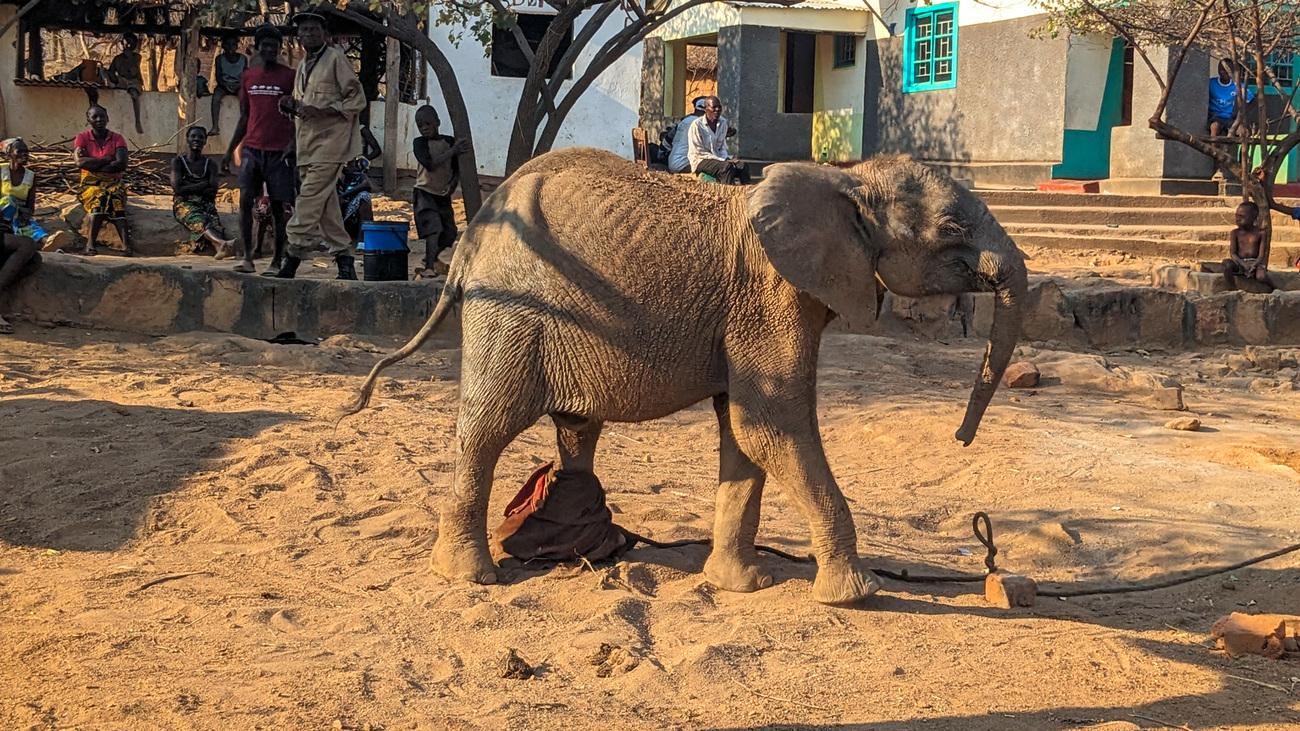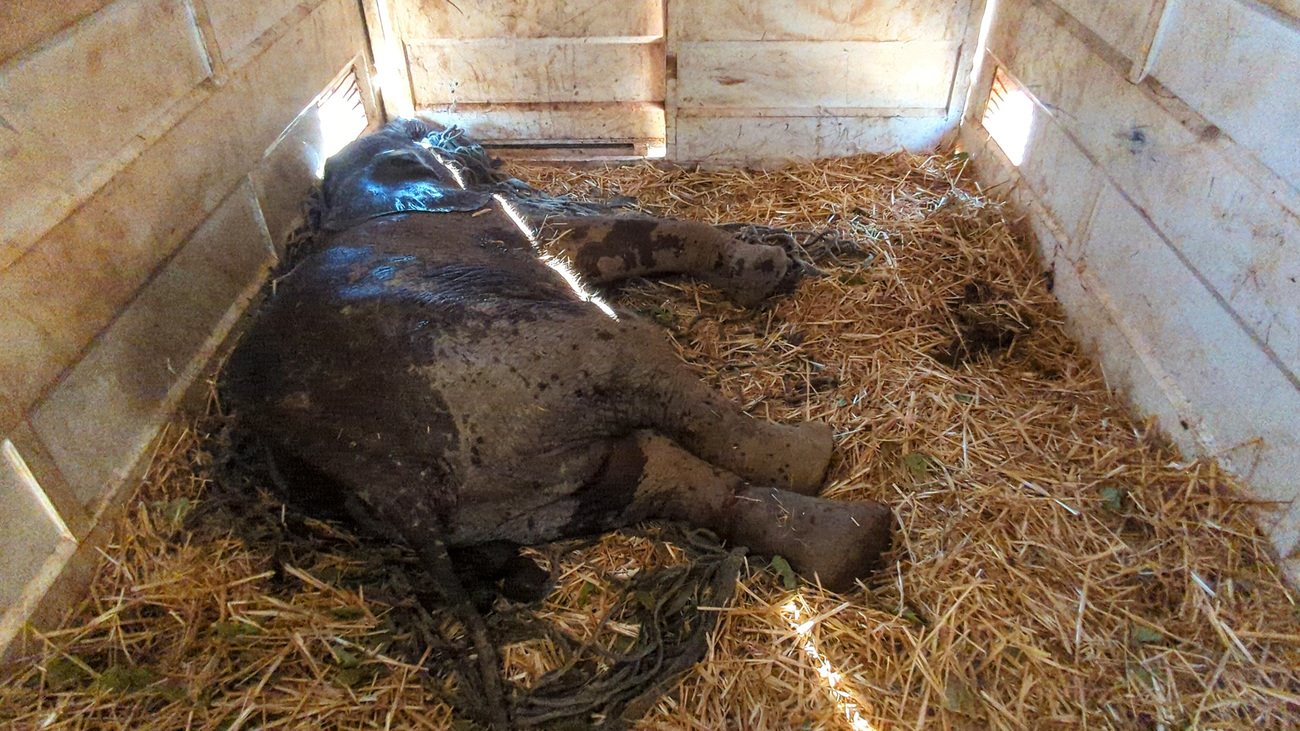Blog
Long’uro: one elephant’s story of immense resilience
Read moreRescuing baby Ndewa, the ‘beloved’ elephant orphan

When a starving baby elephant wandered close to a Zambian village without her mother or herd, the community knew just what to do. This wasn’t the first time they’d found an orphaned calf, so they quickly contacted Game Rangers International (GRI), one of IFAW’s partners, to come to the orphan’s rescue.
GRI’s community outreach ranger, Chrispine, knew the hungry little elephant might disappear into the nearby forest, where it would be nearly impossible to find her. So Chrispine asked the community in Chikumbi village to safely hold the calf until GRI arrived. She also asked them to dig a hole so the calf could drink water and bathe in mud, crucial for elephants to stay cool and protect their skin.
The community sprang into action to save the vulnerable calf and named her Okondewa (Ndewa for short), or ‘beloved’ in Chinyanja, the local language.
When GRI’s rangers arrived, they found Ndewa to be extremely emaciated and confused. They assessed that she was probably around two years old, an age when elephants can browse but still need to drink their mother’s milk for protein and fat.
The rescue team found masao and mbola fruit seeds in her dung, so she had clearly survived by browsing. Judging by her fragile condition, though, she had probably gone a month without milk.
Much longer, and her chances of survival would have disappeared.
The team gently loaded her into a trailer IFAW had provided and spent the night at the local Department of National Parks and Wildlife headquarters. Her condition was so critical that they couldn’t give her milk straightaway—she had been without it for too long. To begin replenishing her energy and hydration, they gave her electrolytes and the fruits she was used to.
Then they stabilised her for the next day’s eight-hour journey to Lusaka Elephant Nursery, where IFAW and GRI rehabilitate orphaned calves with the goal of eventually returning them to the wild.

Chikumbi village sits near the Zambezi River, opposite Zimbabwe and neighbouring Mozambique. Elephants frequently cross the river here.
GRI wrote ‘It’s possible that this young calf became separated from her herd during one of these crossings. However, poaching and human-wildlife conflict remain a consistent threat in Rufunsa Game Management Area.’
Poaching is a big problem in border regions because criminals can kill elephants for their ivory before escaping into a neighbouring country. Tragically, when mothers die, their calves have very little chance of survival—especially if they’re still dependent on milk.
‘This is the 17th elephant orphan we have rescued from this area,’ GRI added.
One of those orphans, named Chikumbi for the village that found both her and Ndewa, was rescued last year, just days after the Lusaka Elephant Nursery first opened. She became one of the first elephants to welcome Ndewa to the nursery.
Ndewa is at the very beginning of a long road. In the wild, elephants usually rely on their mothers until they are sixteen. Orphaned elephants need to learn not only survival skills but social skills as well.
That’s why, on average, it takes twelve years to rescue and rehabilitate an orphaned elephant.
‘Ndewa’s survival will only be possible with specialized nutrition and non-stop supervision and care,’ GRI wrote. ‘She will certainly need a lot of love to pull through as she has suffered significant emotional trauma in abandonment, as well as being significantly physically compromised through starvation.’
Fortunately, she is finding all those essentials with the dedicated team at Lusaka Elephant Nursery.
Just a few days after her rescue, Shonagh Massie from GRI sent an update to IFAW, saying: ‘Ndewa is doing surprisingly well so far, given her terrible condition. She is learning to use a bottle and starting to associate the keepers with comfort. She is sleeping well, which shows she is relaxing into her new environment, although the keepers often have to help her back onto her feet as she is still very weak.
‘But with every bottle, we are given a little more hope.’
Within a few weeks, the keepers encouraged her to leave the stable and explore the enclosed area just outside it. She stayed very alert, seeking comfort from the keepers, and they soon led her back to the stable so she could rest where she felt safe.
Conservation behaviour advisor Lisa Olivier said: ‘Orphans that have been on their own for a long time prior to rescue need a much slower timeline of rehabilitation, needing to recover from a lot physically as well as psychologically.’
After a few days of exploring the enclosure on her own, she was finally ready to meet the rest of the rescued orphans without the security of the wooden partitions between their stalls. Chikumbi and the others welcomed her with curiosity and friendly bonding behaviours.
Ndewa’s health is stable, and she continues to gain strength and momentum every day. Her time out on the walks with the other siblings has become an instrumental part of her recovery and well-being.
For endangered species such as the African savannah elephant, every individual is critical for the species’ survival.
Elephants are keystone species, meaning that if they disappear then entire ecosystems could collapse.
Elephants like Ndewa can only survive if they have safe routes to move freely through their natural, healthy habitats. That’s why IFAW created Room to Roam, an ambitious and visionary approach to protecting elephants and the human communities they share land and resources with.
Ndewa, Chikumbi, and the other orphaned calves at Lusaka Elephant Nursery will—hopefully—one day return to the wild. They may even have calves of their own. IFAW’s Room to Roam wants to ensure that those calves never have to endure the trauma that Ndewa and Chikumbi have.
Instead, they will have a healthy, connected landscape they can roam through—free, safe, and happy.
Our work can’t get done without you. Please give what you can to help animals thrive.
Unfortunately, the browser you use is outdated and does not allow you to display the site correctly. Please install any of the modern browsers, for example:
Google Chrome Firefox Safari